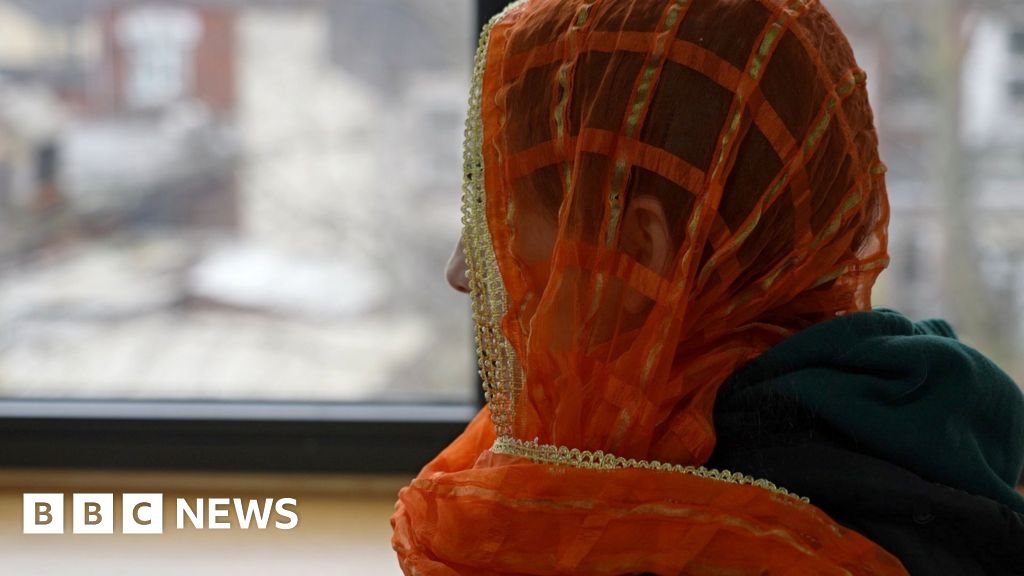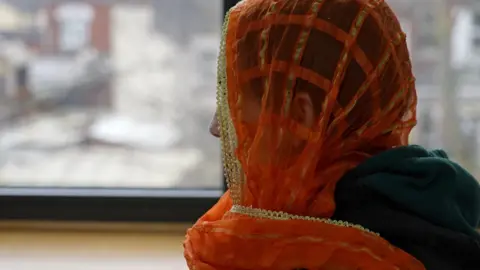 BBC
BBCA global network has fleeced students out of tens of thousands of pounds for worthless visa documents they hoped would enable them to work in the UK.
A BBC investigation has found middlemen working as recruitment agents preyed on international students who wanted jobs in the care industry.
The students paid up to £17,000 each for sponsorship certificates that should have been free.
When they applied for skilled worker visas, their paperwork was rejected by the Home Office for being invalid.
We have seen documentation that shows one man, Taimoor Raza, sold 141 visa documents – most of which were worthless – for a total of £1.2m.
He denies doing anything wrong and has paid back some of the money to students.
Mr Raza rented offices and hired staff in the West Midlands and promised dozens of students work in care homes and employment sponsorship.
We have been told he began selling legitimate documents and that a handful of students obtained visas and genuine jobs.
But many more lost their entire savings on worthless paperwork.
‘I’m trapped here’
The BBC has spoken to 17 men and women who have lost thousands trying to obtain work visas.
Three of the students, all women in their 20s, paid out a total of £38,000 to different agents.
They said they had been sold a dream in their native India that they would make their fortunes in England.
Instead, they had ended up penniless and too afraid to tell their families back home.
“I am trapped here [in England],” Nila* told the BBC.
“If I do return, all of my family’s savings would’ve been wasted.”
 Other
OtherThe UK’s care sector, including care homes and agencies, had a record number of vacancies in 2022 with 165,000 posts unfilled.
The government widened the net for recruitment by allowing international applications, leading to a boom in interest from the likes of India, Nigeria and The Philippines.
Applicants must have an eligible sponsor, such as a registered care home or agency, and jobseekers should not have to pay a penny for their sponsorship or visa.
The sudden opening of this route has been exploited by middlemen taking advantage of students looking to work full time.
Although the students we spoke to had made great attempts to remain in the UK legally, they now face being sent back to their country of origin.
Victim’s calls blocked
Nadia*, 21 and from India, arrived in the UK in 2021 on a study visa to complete a BA in computer sciences.
After a year, she decided to look for a job instead of paying tuition fees of £22,000 a year.
A friend gave her the number for an agent who told Nadia he could provide the correct documents needed for care work for £10,000.
She said the agent made her feel at ease and even told her she reminded him of his own relatives.
“He told me ‘I won’t charge a lot of money from you because you look like my sisters’,” Nadia, who lives in Wolverhampton, said.
She paid him £8,000 upfront, and waited for six months for a document to arrive that stated she had work at a care home in Walsall.
“I directly called the care home and asked about my visa, but they said they didn’t provide any certificates of sponsorship because they already had full staff,” Nadia said.
The agent blocked Nadia’s calls and she was advised to go to the police but she told the BBC she was too scared.
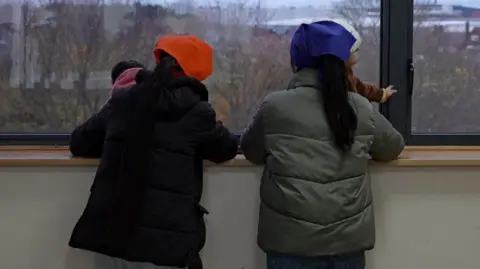
Nila, who is living in Birmingham, said her family believed investing in a life in the UK would allow her to gain skills and earn more than in India.
“My father-in-law was in the army, he trusted me with all his savings,” she said.
She visited a training agency in Wolverhampton to switch her student visa to a care worker one.
The agents were very polite, she said, and showed emails, letters and copies of visas to prove their legitimacy.
Nila and the other students were totally convinced the men were going to change their lives.
“The way in which they first meet us, its God-like. That’s how much they win over our trust,” she said.
She paid £15,000 for documents that ended up being worthless and rejected by the Home Office, having already spent £15,000 of her family’s money on her studies.
Nila said her life had been destroyed.
“Those scammers are still roaming free today. They have no fear,” she said.
86 students lost thousands
The BBC has learned that Taimoor Raza, a Pakistani national who had been living in Wolverhampton and working in Birmingham, is at the top of one visa network.
He approached recruitment agencies in the West Midlands and said he could arrange work in care homes and organise visa applications for their clients.
The BBC has seen a file full of sponsorship documents that Mr Raza provided one agency for 141 applicants.
Each person paid between £10,000 and £20,000 and the total amounts to £1.2m.
We have verified that Mr Raza was sending these sponsorship documents as PDF files over Whatsapp.
Of them, 86 received worthless paperwork that was rejected by the Home Office as invalid.
A further 55 successfully obtained a visa, but the care homes they had been promised work with said they had no record of the arrangement.
The BBC contacted Taimoor Raza, who has been in Pakistan since December 2023, to put the allegations to him.
He responded to say the students’ claims were “false” and “one-sided” and that he had contacted his lawyers.
He did not respond to our request for an interview.

Student Ajay Thind said he was recruited to work for Mr Raza after he paid him £16,000 for a care worker visa.
He was among six people paid between £500-£700 a week, compiling paperwork and filling in forms for applicants.
Mr Thind said Mr Raza rented offices and even took his team on an all-expenses trip to Dubai.
His suspicions arose in April 2023 when he noticed applications were being rejected by the Home Office. Some included his friends, who had paid a total of £40,000.
“I told Raza and he said to me, ‘your brain isn’t made for stress, let me handle the stress.’
“I didn’t leave as I needed the money,” he said. “I got stuck in such a bad situation.”
Mr Thind said his boss was working with numerous agencies, so the figure of £1.2m is likely to be much higher.
 Other
OtherMost victims have not contacted police.
“A lot of people don’t go to the police because they’re terrified of the Home Office and the consequences of reporting,” said Luke Piper, head of immigration at the Work Rights Centre.
Instead, they have sought help from a Sikh temple in the West Midlands – the Gurdwara Baba Sang Ji, in Smethwick.
Members have been leading the fightback against agents who failed to deliver on their promises and have managed to claw money back for some people.
The elders at the temple even managed to summon Mr Raza to a meeting in November 2023, where it is said he agreed to refund money and stop his activities.
The gurdwara’s Sikh Advice Centre, set up to help people during the pandemic, managed to get one young mother, Harmanpreet, her money back by confronting agency staff in person.
She said she had been pushed to the brink of suicide by her ordeal.
“I considered taking my own life. I only restarted my life because of my daughter and the Sikh Advice Centre,” she said.
Monty Singh, from the centre, said hundreds of people had contacted them for help.
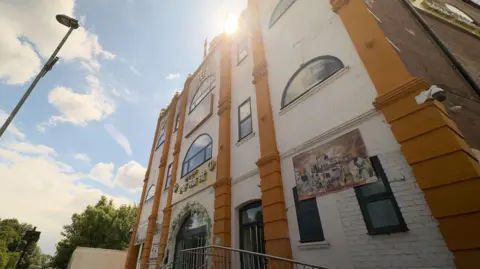
He and the team began dealing with cases in 2022 by outing those involved on social media, hoping that naming and shaming them would warn people not to trust them.
More people got in touch after seeing the posts and names were added to the list.
Mr Singh said they began to realise the agents operated like a pyramid scheme.
“There are loads of little team leaders and agents… and some of them might get commission,” he said.
Some of the smaller agents were hairdressers and bus drivers who saw an opportunity to make money, he said.
 Monty Singh
Monty SinghHe said Mr Raza had repaid £258,000 but that the advice centre had now handed the case over to the National Crime Agency.
Other agents had paid money back because of the great shame it had brought on their families.
“Family honour means everything to an individual. We identify, investigate, look at all the evidence that is there,” Monty said.
“Once we’ve got that, we speak to the family and the shame it brings on them, they just want to repay the victim and clear their family name.”
Huge rise in visa applications
There has been a six-fold increase in applications from students to obtain UK work visas – with over 26,000 between June 2022 to June 2023, up from 3,966 the year before.
In July last year, the Home Office amended rules to prevent international students obtaining work visas before completing their studies.
But the Sikh Advice centre said only tough action by police and immigration officials will stop the illegal trade in visas.
Jas Kaur, who works alongside Monty, said the government must liaise with faith leaders.
“If you’re not talking to the people on the ground, you have no idea what’s really going on,” she said.
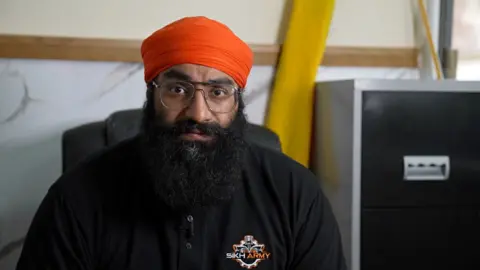
A Home Office spokesperson said there were “stringent systems in place to identify and prevent fraudulent visa applications, and any individual being targeted by these fraudsters needs to know that if their sponsorship certificate is not genuine, it will not succeed”.
“We will continue to take tough action as well against any unscrupulous companies and agents who are seeking to abuse, exploit or defraud overseas workers,” they added.
Mr Piper, from the Work Rights Centre, said the government needed to support victims and “create a framework of safe reporting without fear of reprisal from the Home Office simply because they’ve reported their employer to them”.
The British dream
There are no official figures on the numbers of people who have lost money paying agents for worthless visa paperwork.
“What is clear is that it is happening on quite a significant scale as we’re hearing from people all over the country,” Mr Piper added.
Back in Smethwick, the Sikh Advice Centre hopes to expand the operation to other gurdwaras and have also begun educating people in India of the risks they take when leaving their country for study or work.
“Educating people involves the harsh truth that the success stories of a few doesn’t mean it will happen for everyone,” Mr Singh said.
“It’s also undoing the belief that the only way they can do better is to follow the British or American dream.”
*Some names have been changed
